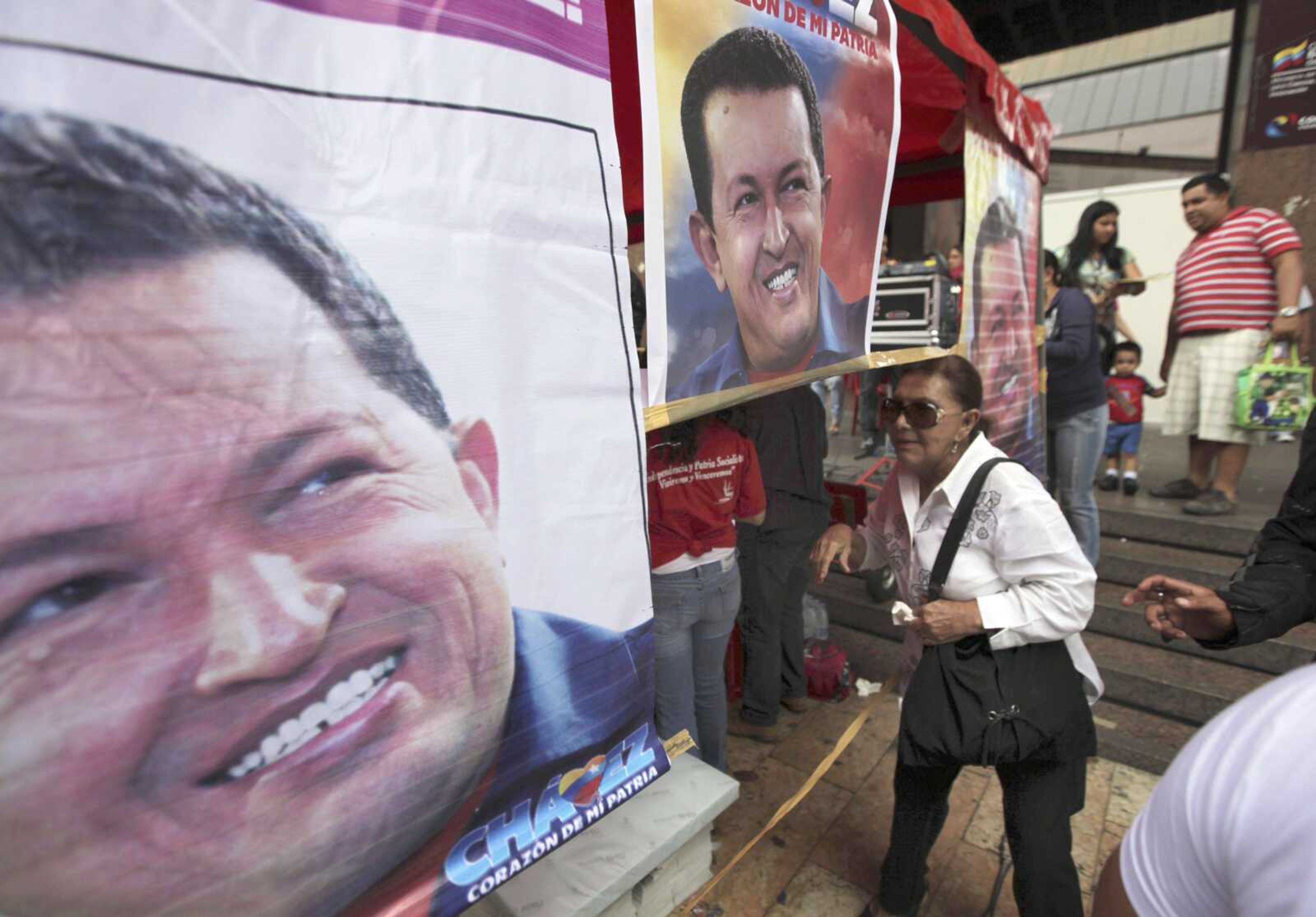Venezuela poll: Chavez leading presidential rival by 10 points
CARACAS, Venezuela -- President Hugo Chavez held a 10-point lead over rival Henrique Capriles in one of the final polls ahead of Venezuela's Oct. 7 election, but the survey released Tuesday showed the challenger narrowing the gap. The poll by Datanalisis, one of Venezuela's most respected polling firms, found that about 49 percent said they intend to vote for Chavez and about 39 percent said they plan to vote for Capriles...
CARACAS, Venezuela -- President Hugo Chavez held a 10-point lead over rival Henrique Capriles in one of the final polls ahead of Venezuela's Oct. 7 election, but the survey released Tuesday showed the challenger narrowing the gap.
The poll by Datanalisis, one of Venezuela's most respected polling firms, found that about 49 percent said they intend to vote for Chavez and about 39 percent said they plan to vote for Capriles.
About 11 percent didn't reveal a preference, said Luis Vicente Leon, who heads the polling firm.
The results showed Capriles narrowing the 46-31 percent lead that Chavez held in June's poll by the same company.
Leon said it was the final poll Datanalisis plans to release publicly before the vote. It's possible the candidates' percentages may already have shifted somewhat since the survey was carried out weeks ago.
The poll questioned 1,600 people between Aug. 25 and Sept. 5, and had a margin of error of about 2 percentage points. It was paid for a group of about 100 clients, including businesses as well as government entities.
Leon said Capriles' active campaigning in about 260 towns across the country has had an impact.
Chavez, in contrast, has concentrated on a smaller number of campaign rallies, and has been less active after more than a year of cancer treatments including surgeries, radiation and chemotherapy.
Even though Chavez has said he's now cancer-free, Leon said the president's campaign clearly has been affected by his health problems.
He said that after nearly 14 years in office, Chavez for the first time will face a strong rival and that no other opposition candidate has achieved such support in pre-election polls when facing Chavez. The pollster also cautioned that changes in public opinion can still occur in the less than two weeks before the Oct. 7 vote.
Polls suspect
Venezuelans have been bombarded with widely varying poll results ahead of the vote, and some pollsters haven't been open about discussing their sources of funding or political leanings.
Some political surveys, including those conducted by the pollster GIS XXI, run by Chavez's former justice minister Jesse Chacon, have repeatedly shown the president with a lead of more than 20 percent, and have been touted on state television.
Other polls, such as those of Consultores 21 and Varianzas, have shown Capriles either roughly even with Chavez or slightly ahead.
A survey released by Varianzas on Tuesday indicated a close race, with about 50 percent saying they plan to vote for Chavez and 48 percent siding with Capriles. The Varianzas poll consulted 2,000 people between Sept. 7 and 20, and had an error margin of about 2 percent, said Rafael Delgado, the company's director. He said the survey was financed by a private group, which he declined to reveal.
Meanwhile, state television broadcast the results of a survey by another company, International Consulting Services, saying Chavez had a lead of nearly 20 percentage points. The source of funding for that poll was unclear.
The wide differences in results have led many Venezuelans to doubt the accuracy of polls.
"The variation between the polls is so big that there are some that say Chavez is winning by 30 points and others that say he's losing by almost 10 points," said Angel Alvarez, a political-science professor at Central University of Venezuela. "Most people don't believe in any of the polls anymore because they see so much variability that they say somebody is lying or everybody is lying, and on top of that ... there's been a lot of skepticism about the quality of the polls to predict results."
Many polls in the country are conducted using face-to-face interviews with people at their homes, and firms typically release details of their methodologies, including how interview questions are framed. In some cases, though, pollsters haven't released full details.
Datanalisis is widely considered one of the country's leading polling firms. It has had a record of accuracy in past elections and has earned respect from both political camps with its monthly surveys. The pollster accurately gauged that Chavez was leading ahead of his last re-election victory in 2006, when he won with 63 percent of the vote.
Chavez's approval ratings have slipped since then, and he has been spending heavily on social programs and public housing construction this year seeking to shore up support while facing a vigorous challenge by Capriles.
Adding to the uncertainty ahead of the vote is the large segment of voters, in some polls more than 10 percent, who describe themselves as undecided or who don't reveal which candidate they plan to support.
In Venezuela nowadays, people seem to view it as normal for there to be a "war of the polls" and don't appear to be swayed one way or the other by the surveys, said Ignacio Avalos, director of the Venezuelan Electoral Observatory, a vote monitoring group.
"Part of the election campaign is about making people think you're the one who's going to win and generating a positive effect," Avalos said. Despite the conflicting surveys, he said, "I have the impression that the results are going to be close, that it's going to be an election decided by a narrow margin."
Connect with the Southeast Missourian Newsroom:
For corrections to this story or other insights for the editor, click here. To submit a letter to the editor, click here. To learn about the Southeast Missourian’s AI Policy, click here.









